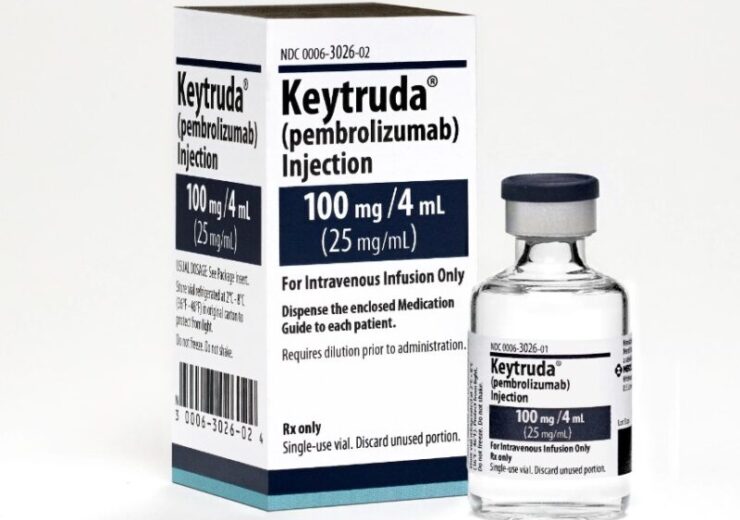In the US, Keytruda has been approved in combination with platinum-based chemotherapy as neoadjuvant treatment for resectable NSCLC and then continued as a single agent as adjuvant treatment post-surgery

Keytruda product shot. (Credit: Merck & Co.)
Merck has obtained new approvals for its anti-PD-1 therapy Keytruda (pembrolizumab) from the US Food and Drug Administration (FDA) and the European Commission (EC) in non-small cell lung cancer (NSCLC).
In the US, the drug has been approved in combination with platinum-containing chemotherapy as neoadjuvant treatment for resectable NSCLC and then continued as a single agent as adjuvant treatment post-surgery.
The FDA approval was driven by the findings of the Phase 3 KEYNOTE-671 trial.
In the late-stage trial, the Keytruda regimen delivered statistically significant improvements in event-free survival (EFS) and overall survival (OS). This was in comparison to neoadjuvant placebo plus chemotherapy followed by adjuvant placebo alone.
EFS and OS are the dual primary endpoints of the study.
The latest FDA nod means that Keytruda has six indications for NSCLC in the US, covering both metastatic and earlier stages.
Merck Research Laboratories senior vice president and global clinical development late-stage oncology head Marjorie Green said: “Keytruda continues to change the way non-small cell lung cancer is treated across earlier and metastatic disease regardless of PD-L1 expression.
“This approval marks a pivotal moment for the lung cancer community by providing certain patients with earlier stages of non-small cell lung cancer and healthcare providers with an important new treatment option.”
In the European Union (EU), the anti-PD-1 therapy bagged its fifth approval in lung cancer.
The latest approval is for its use as a monotherapy for the adjuvant treatment of NSCLC in adults who are highly prone to recurrence of the condition after complete resection and platinum-based chemotherapy.
Merck, which operates as MSD outside of the US and Canada, secured the approval based on the data from the Phase 3 KEYNOTE-091 trial.
At a median follow-up time of 46.7 months, the anti-PD-1 candidate provided a clinically meaningful improvement in disease-free survival (DFS) among patients who underwent adjuvant chemotherapy, reducing the risk of disease recurrence or mortality by 24%.
